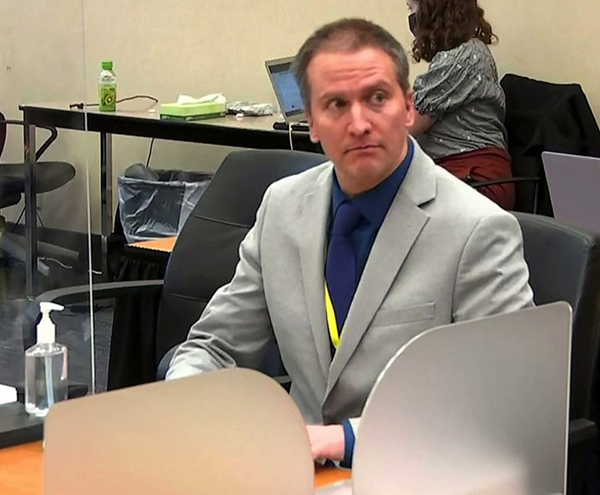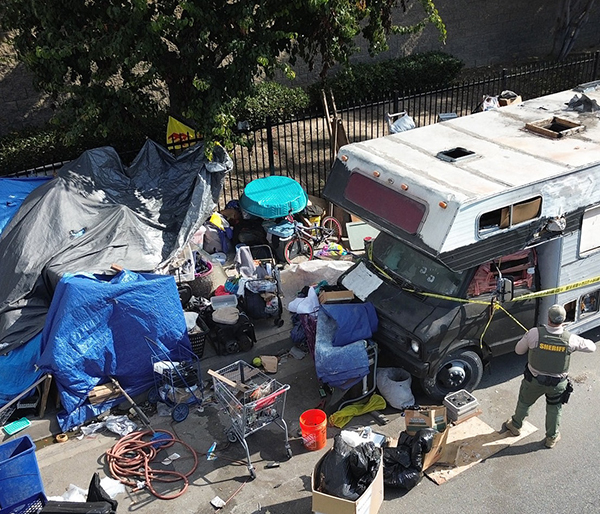THE HUTCHINSON REPORT
By Earl Ofari Hutchinson
Contributing Columnist
Former Minneapolis police officer Derek Chauvin got his day in court. He was able to put on a plausible defense that George’s Floyd’s death did not come at his hands (or knee) but because of Floyd’s prior severe medical conditions.
A recent USA Today/Ipsos poll found that a lot of people have had second thoughts about what happened in that deadly encounter, that maybe it was just a case of a cop doing his job.
Despite that, Chauvin was convicted on the three charges against him in the slaying of Floyd. At best it is a pyrrhic victory.
Yes, Floyd’s family got a monster wrongful death settlement. But the brute fact is that Floyd is dead. His children are fatherless.
But Chauvin’s conviction doesn’t necessarily mean the criminal justice system — or anything else in the country — has changed.
Not one Republican House member backed the George Floyd Police Reform Act. To get passage, President Joe Biden and the Democrats ran like crazy from any hint that defunding the police would be part of the bill.
That was a prime cry of the massive police reform protests in the wake of the Floyd killing.
At worst, the Chauvin saga leaves unanswered the perennially tormenting question just why is it still near impossible to fire, let alone arrest, prosecute and convict cops like Chauvin who wantonly overuse deadly force?
Chauvin almost certainly would not have been one of the rare cops hauled before a court docket if tens of millions hadn’t been shocked at the video and heard the audio that showed in graphic, brutal,and drawn-out detail Floyd in his death agonies on the ground with Chauvin’s knee on his neck. Even then, if Minneapolis and other cites hadn’t been rocked by furious and even violent protests, Chauvin still may have walked.
Though Chauvin was fired, there was much foot-dragging by county prosecutors on what, if any, charges they would bring against him. Minnesota Attorney General Keith Ellison saw the fast-developing public relations and political nightmare of an unprosecuted Chauvin, and quickly stepped into charge him.
Then there was the trial. Chauvin, like other cops charged with excessive force, had top-gun defense lawyers with lots of experience defending police officers accused of misconduct. Police unions bankroll their defense and spare no expense.
While the Minneapolis police union publicly declared it didn’t spring Chauvin on bail or provide for his defense, enough sums were raised to ensure him a first-rate defense.
Chauvin’s defense team had some formidable weapons at hand. They muddied things by showing that Floyd had drugs in his system and that this or a heart condition, or both, was the real cause of his death. They paired that line of attack with the claim that Floyd was combative and that the force Chauvin used was necessary for restraint.
There’s more. Minnesota Attorney General Ellison piled the three murder and manslaughter charges on him as a hedge to convict him of something. To beat them, the defense tried to show there was no intent to harm, no malice of forethought, no felony use of force and that Chauvin did not have “a depraved mind, without regard for human life.”
That is all subjective, open to much legal interpretation and thus wide open to muddying the evidence.
Typically, when police officers such as Chauvin are tried by a jury, police defense attorneys seek to get as many middle-class people on the jury as possible. The presumption is that they are much more likely to believe the testimony of police and police defense witnesses than Black witnesses, defendants or even the victims. It’s a presumption that has been borne out in police misconduct trials time and again.
It’s an uphill battle for prosecutors to overcome both pro-police attitudes and negative racial stereotypes. In past studies, Stanford University researchers found that even when many whites are presented with evidence that the criminal justice system is loaded with racial bias toward Blacks, they are more likely to support tough, draconian laws such as three strikes, tough sentencing and increased incarceration.
The negative perceptions of Blacks, especially Black males, by much of the public are not the only problem in effecting effective legal measures against police violence. There is no ironclad standard of what is or isn’t an acceptable use of force in police misconduct cases. It often comes down to a judgment call by the officer.
Chauvin’s conviction is an anomaly. It won’t erase the top-heavy benefits that he and other cops who blatantly use deadly force continue to receive within and without the law.
Earl Ofari Hutchinson is an author and political analyst. His latest book is “Why Black Lives Do Matter.” (Middle Passage Press). He also is the host of the weekly Hutchinson Report on KPFK 90.7 FM Los Angeles and the Pacifica Network.











